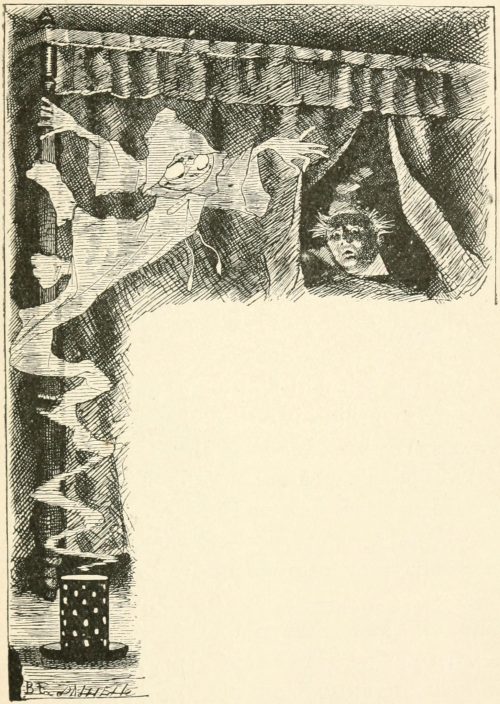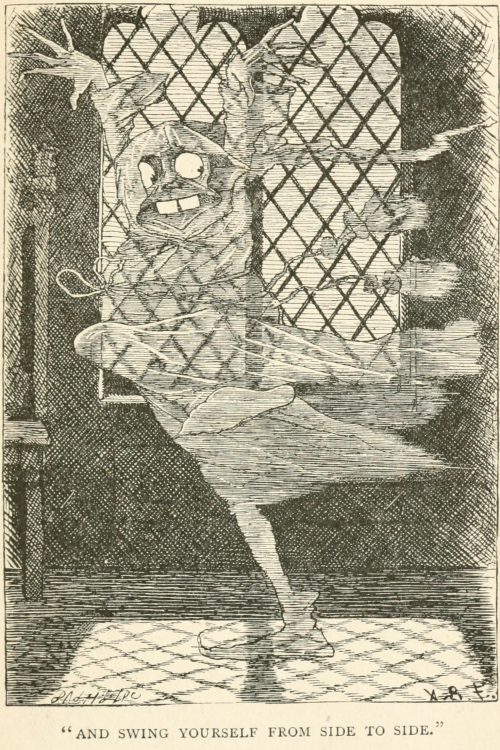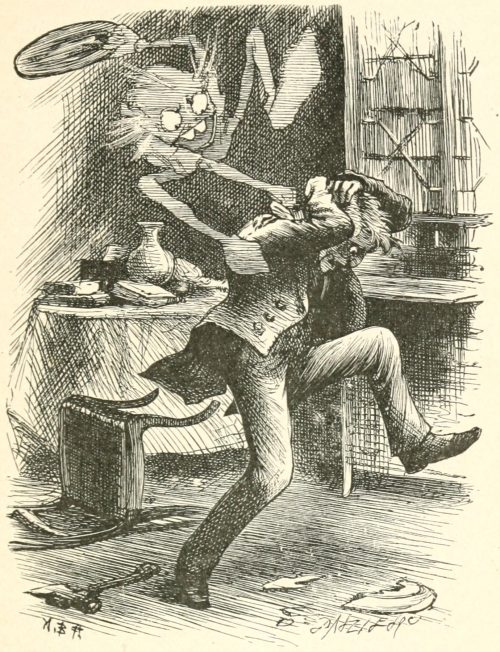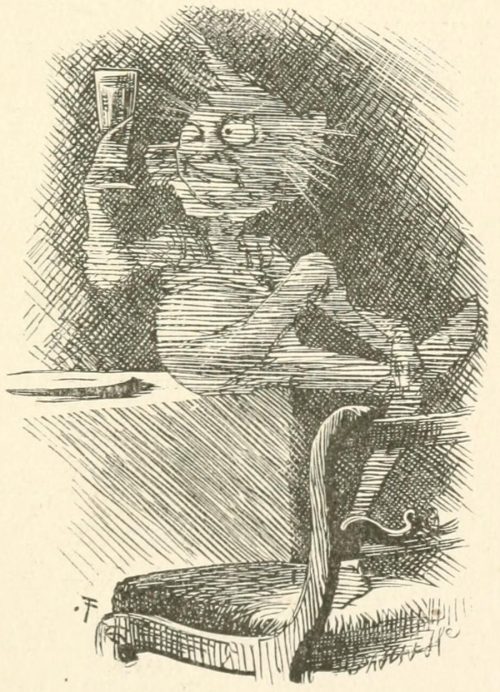Lewis Carroll – Phantasmagoria Poem, in Seven Cantos by Lewis Carroll
Lewis Carroll – Phantasmagoria Poem : Cantos I. The Trystyng
Lewis Carroll – Phantasmagoria Poem : Cantos II. Hys Fyve Rules
Lewis Carroll – Phantasmagoria Poem : Cantos III. Scarmoges
Lewis Carroll – Phantasmagoria Poem : Cantos IV. Hys Nouryture
Lewis Carroll – Phantasmagoria Poem : Cantos V. Byckerment
Lewis Carroll – Phantasmagoria Poem : Cantos VI. Dyscomfyture
Lewis Carroll – Phantasmagoria Poem : Cantos VII. Sad Souvenaunce
Lewis Carroll – Phantasmagoria Poem : Cantos II. Hys Fyve Rules
Hys Fyve Rules
“My First—but don’t suppose,” he said,
“I’m setting you a riddle—
Is—if your Victim be in bed,
Don’t touch the curtains at his head,
But take them in the middle,
“And wave them slowly in and out,
While drawing them asunder;
And in a minute’s time, no doubt,
He’ll raise his head and look about
With eyes of wrath and wonder.
“And here you must on no pretence
Make the first observation.
Wait for the Victim to commence:
No Ghost of any common sense
Begins a conversation.
“If he should say ‘How came you here?’
(The way that you began, Sir,)
In such a case your course is clear—
‘On the bat’s back, my little dear!’
Is the appropriate answer.
“If after this he says no more,
You’d best perhaps curtail your
Exertions—go and shake the door,
And then, if he begins to snore,
You’ll know the thing’s a failure.
“By day, if he should be alone—
At home or on a walk—
You merely give a hollow groan,
To indicate the kind of tone
In which you mean to talk.
“But if you find him with his friends,
The thing is rather harder.
In such a case success depends
On picking up some candle-ends,
Or butter, in the larder.
“With this you make a kind of slide
(It answers best with suet),
On which you must contrive to glide,
And swing yourself from side to side—
One soon learns how to do it.
“The Second tells us what is right
In ceremonious calls:—
‘First burn a blue or crimson light’
(A thing I quite forgot to-night),
‘Then scratch the door or walls.'”
I said “You’ll visit here no more,
If you attempt the Guy.
I’ll have no bonfires on my floor—
And, as for scratching at the door,
I’d like to see you try!”
“The Third was written to protect
The interests of the Victim,
And tells us, as I recollect,
To treat him with a grave respect,
And not to contradict him.”
“That’s plain,” said I, “as Tare and Tret,
To any comprehension:
I only wish some Ghosts I’ve met
Would not so constantly forget
The maxim that you mention!”
“Perhaps,” he said, “you first transgressed
The laws of hospitality:
All Ghosts instinctively detest
The Man that fails to treat his guest
With proper cordiality.
“If you address a Ghost as ‘Thing!’
Or strike him with a hatchet,
He is permitted by the King
To drop all formal parleying—
And then you’re sure to catch it!
“The Fourth prohibits trespassing
Where other Ghosts are quartered:
And those convicted of the thing
(Unless when pardoned by the King)
Must instantly be slaughtered.
“That simply means ‘be cut up small’:
Ghosts soon unite anew.
The process scarcely hurts at all—
Not more than when you ‘re what you call
‘Cut up’ by a Review.
“The Fifth is one you may prefer
That I should quote entire:—
The King must be addressed as ‘Sir.’
This, from a simple courtier,
Is all the Laws require:
“But, should you wish to do the thing
With out-and-out politeness,
Accost him as ‘My Goblin King!
And always use, in answering,
The phrase ‘Your Royal Whiteness!’
“I’m getting rather hoarse, I fear,
After so much reciting:
So, if you don’t object, my dear,
We’ll try a glass of bitter beer—
I think it looks inviting.”














